How Snow Falls HOW SNOW FALLS Craig Raine  Atlantic Books LONDON First published in Great Britain in hardback in 2011 by Atlantic Books, an imprint of Atlantic Books Ltd. Copyright Craig Raine, 2010 The moral right of Craig Raine to be identified as the author of this work has been asserted by him in accordance with the Copyright, Designs and Patents Act of 1988. All rights reserved. No part of this publication may be reproduced, stored in a retrieval system or transmitted in any form or by any means, electronic, mechanical, photocopying, recording or otherwise, without the prior permission of both the copyright owner and the above publisher of this book. 10 9 8 7 6 5 4 3 2 1 A CIP catalogue record for this book is available from the British Library. ISBN: 978 1 84887 285 1
Atlantic Books LONDON First published in Great Britain in hardback in 2011 by Atlantic Books, an imprint of Atlantic Books Ltd. Copyright Craig Raine, 2010 The moral right of Craig Raine to be identified as the author of this work has been asserted by him in accordance with the Copyright, Designs and Patents Act of 1988. All rights reserved. No part of this publication may be reproduced, stored in a retrieval system or transmitted in any form or by any means, electronic, mechanical, photocopying, recording or otherwise, without the prior permission of both the copyright owner and the above publisher of this book. 10 9 8 7 6 5 4 3 2 1 A CIP catalogue record for this book is available from the British Library. ISBN: 978 1 84887 285 1
eBook ISBN: 978 0 85789 250 8 Printed in Great Britain Atlantic Books
An imprint of Atlantic Books Ltd
Ormond House
2627 Boswell Street
London WCIN 3JZ www.atlantic-books.co.uk How Snow Falls Like the unshaven prickle of a sharpened razor, this new coldness in the air, the pang of something intangible. Filling our eyes, the sinusitis of perfume without the perfume.
And then loves vertigo, loves exactitude, this snow, this transfiguration we never quite get over. I Remember My Mother Dying I remember we were driving to my fathers funeral. An overcast day. A downcast day. Outside Darlington, eight miles away, my ten-year-old son Vaska asked: Do you think your brother will try to murder you? My cock shrank. I remember my fathers open coffin in the unlit dining room.
White nostril hairs, fog-lights in the gloom. His face was the colour of old glazed cheddar. His right eyelid was straining open, to see what was going to happen: stitches stretched the parchment like the flysheet of a tent. It was the face of someone about to be shot, about to flinch away from being hit, apprehensive as those Hungarian security police, all their body language a single plea, snapped by that Life magazine photographer John Sadovy, just as the trigger was pulled in Budapest in 1956. I felt faintly sick. I remember that my mother had found a phrase, empty, sentimental, formulaic self-praise, something to say, to explain why my fathers corpse was on display. I remember that my mother had found a phrase, empty, sentimental, formulaic self-praise, something to say, to explain why my fathers corpse was on display.
She repeated it to everyone as they offered their commiserations. She was playing the indomitable wife: I looked after him all his life and I wasnt going to let anyone else look after him now. Pure pretence. She went along with it, but the whole stupid idea had my brothers wonky, macabre steer. I remember the funeral congregation paying wary attention to my brother's affected upper-gloss voice pledging to care for my mother. His solemn promise.
Three years later, he turned up from god knows where and terrorized the middle-aged female wardens, issuing edicts, insults and orders, a rip-tide of abuse by telephone every night and all night long. It was a little freehold flat in sheltered housing. My mother began to lose her mind. I remember my brother, drunk, as usual, announcing his 3.30 a.m. arrival by leaning on my front doorbell. And shouting through the letterbox as well.
Ive brought you my mothers ashes. The ineffectual, thirty-second thrashing I gave him was a surprise to me. I was hampered by my nudity, my bare feet, my open dressing gown and he cycled shakily off to Summertown. I dont think he was expecting me to spurn the sturdy screw-top bronze plastic urn. I remember seeing my brother on a bench, sweaty, unshaven, intense, his tight tie-knot shiny with dirt, the morning after our mother died. It was outside the Radcliffe Hospital.
He was talking to himself, spraying spittle like a madman. I laughed out loud. Because hed been abusive, he wasnt allowed to see my mothers body in the morgue. He was reviewing the legal arguments, taking legal advice, raising his voice... Undertakers, not one but two firms, had already refused to deal with him. I remember the first inkling of my mothers mental decline was a disagreement about the design of plastic cocoa-butter containers, which, against all evidence, she maintained had a hidden pump, something recessed, that would spring up when pressed. I remember, when she took out her top set of teeth at Sunday lunch, facing the truth that something was seriously wrong. I remember, when she took out her top set of teeth at Sunday lunch, facing the truth that something was seriously wrong.
Her wincing delicacy was always so strong she would berate my father for removing his dental plate to rinse out a painful raspberry pip, in public, under our kitchen tap. Sometimes when criticized, hed jut out his bottom set, his whole face a grotesque leer, and ask for a gottle of geer, like a ventriloquists dummy his routine routine, no longer funny. I remember at the same lunch, my mother said: Im dying and added: At least theres the flat. Youll make money on that. Just the two of us. The words were humble, but her voice was slightly trembling.
It was a declaration of love, disguised for her other difficult, distant son, as pure prose. I remember as I helped her into her black coat, she asked me, Am I all right? I remember that I didnt want to frighten her, so I said, Of course you are. And I straightened the turquoise brooch on her right lapel and watched her fingers search for the chipped gilt buttons, one by one, as her blind eyes darkly searched for mine. Youre my protector. Too late, I put my arms too late around her. I remember that every Sunday I made her her favourite drink, lemonade and Advocaat, simple pub plonk.
When she became worried about her mind, she stopped drinking the Snowballs. Another sign. I remember her trying to remember. After she died, we found Post-it notes with names to memorize. HAROLD PINTER. OLIVE WALKER.
Then 1 2 3 4. Then 1 2 3. Then 1 2 3 4. I remember asking questions to test her, and her strategies, her desperate remedies: How old was your father when he got married? Answer: My mother never wanted me. Question: Was he 40? Was he 30? A favourite all-purpose answer: When I had my operation for cancerthere was blood all over my back. Or a variant on Jack Sprat, a nursery rhyme, but also a feat in her private scheme: Jack Sprat could eat no fat,His wife could eat no lean,But with a drop of HP SauceThey licked the platter clean.I remember another scrap of verse that represented Annapurna, F6, Everest: Salvation Army, free from sin,All go to heaven in a corned-beef tin.I remember that before she became ill my mother had a dark-eyed, frail wispy delicacy, a gracefulness created by her partial sight loss. She would stand, smiling, unseeing, with folded hands. When her brain began to struggle and fail, she became ugly.
Her nose got bigger. Everything was coarser. Under her eyes, the bags were great wax seals, swags on a medieval document. I felt an irresistible instinct: I wanted to wash my hands when I left her flat, as if Id just been to the toilet. I remember my mothers instincts were better than mine. Her sense of etiquette survived the indignity of being on the loo: Excuse me.
She said thank you at the end of even the briefest visit. Her manners went on being exquisite. I remember trying to get her to drink a mouthful or two of milk. I was worried in case she lost her swallow reflex. Shed started to fast and she was losing weight at speed. Her: Can I lie down? Me: Yes, when youve drunk the milk.
This is the small talk we make when someone is dying. She takes a sip, then lies back sighing on her pillows. I stroke her hair. She moans, continuously, lying there. Her: Can I lie down now? Pretending to scoff, Me: You
Next page

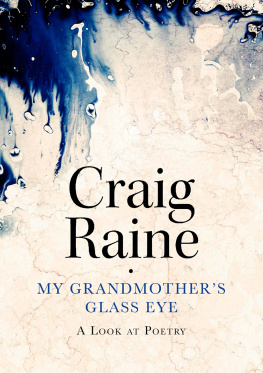
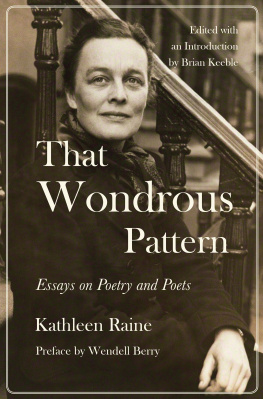
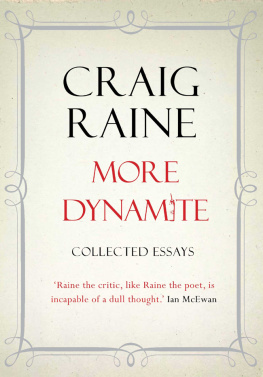



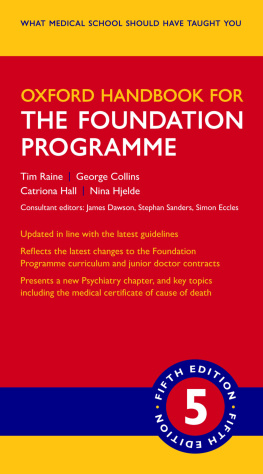

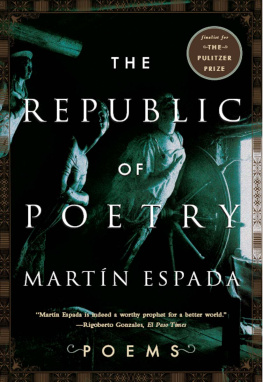
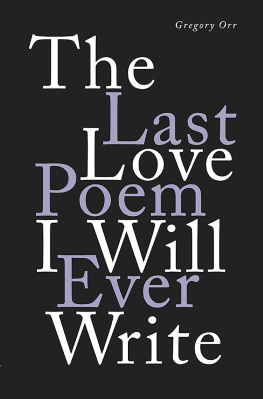
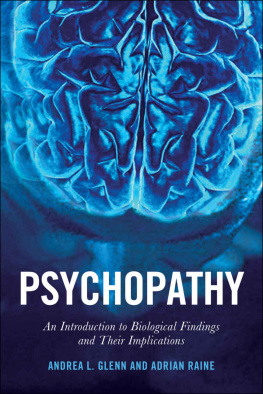
 Atlantic Books LONDON First published in Great Britain in hardback in 2011 by Atlantic Books, an imprint of Atlantic Books Ltd. Copyright Craig Raine, 2010 The moral right of Craig Raine to be identified as the author of this work has been asserted by him in accordance with the Copyright, Designs and Patents Act of 1988. All rights reserved. No part of this publication may be reproduced, stored in a retrieval system or transmitted in any form or by any means, electronic, mechanical, photocopying, recording or otherwise, without the prior permission of both the copyright owner and the above publisher of this book. 10 9 8 7 6 5 4 3 2 1 A CIP catalogue record for this book is available from the British Library. ISBN: 978 1 84887 285 1
Atlantic Books LONDON First published in Great Britain in hardback in 2011 by Atlantic Books, an imprint of Atlantic Books Ltd. Copyright Craig Raine, 2010 The moral right of Craig Raine to be identified as the author of this work has been asserted by him in accordance with the Copyright, Designs and Patents Act of 1988. All rights reserved. No part of this publication may be reproduced, stored in a retrieval system or transmitted in any form or by any means, electronic, mechanical, photocopying, recording or otherwise, without the prior permission of both the copyright owner and the above publisher of this book. 10 9 8 7 6 5 4 3 2 1 A CIP catalogue record for this book is available from the British Library. ISBN: 978 1 84887 285 1